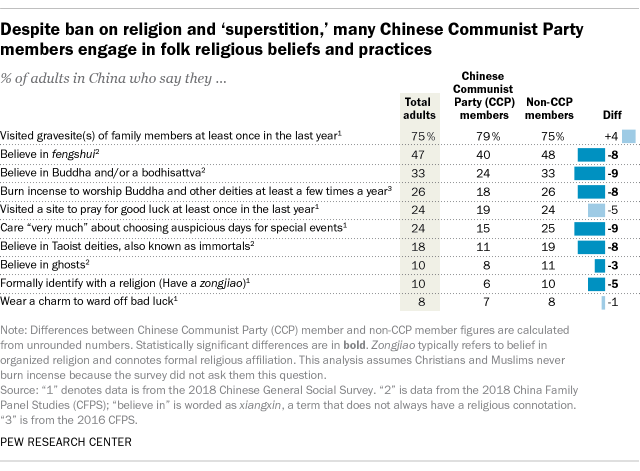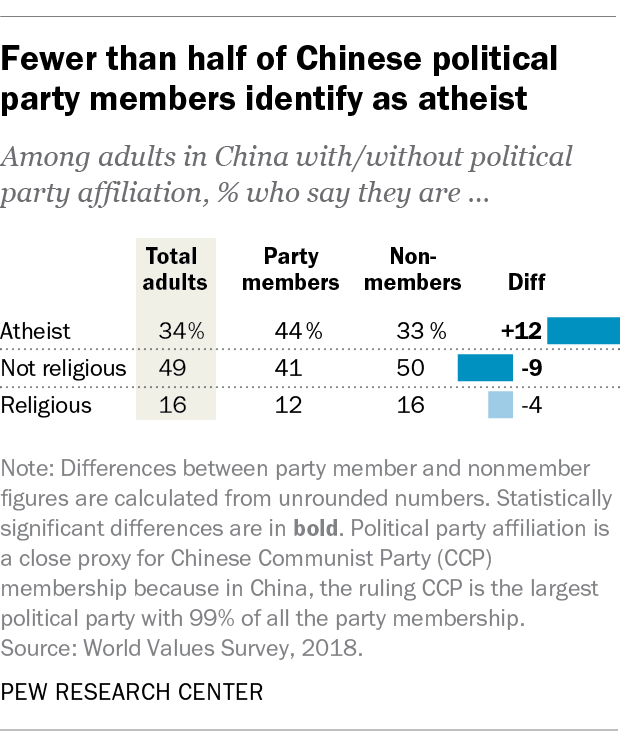The ruling Chinese Communist Party (CCP) promotes atheism and discourages citizens from practicing religion. The 281 million Chinese people who belong to the CCP or its affiliated youth organizations are officially banned from engaging in a broad range of spiritual traditions. However, a new Pew Research Center analysis of academic survey data shows that some CCP members do identify with a religion.
This analysis examines the extent to which Chinese Communist Party members engage in religious beliefs and practices. It is based on Pew Research Center’s August 2023 report, “Measuring Religion in China.” Both the analysis and the report draw on two nationally representative surveys conducted by academic groups in China: the 2018 Chinese General Social Survey and the 2016 and 2018 waves of the China Family Panel Studies. Data on atheism in China comes from the World Values Survey, conducted in 2018.
Some 6% of CCP members formally identify with a religion such as Buddhism, Christianity, Islam or Taoism. This is nearly on par with the 10% of Chinese adults who are not party members, according to the 2018 Chinese General Social Survey (CGSS) – one of several academic surveys examined in the Center’s new analysis.

In fact, CCP members are almost as likely as nonmembers to participate in certain customs that could be considered religious:
- 40% of CCP members believe in fengshui, a traditional Chinese practice of arranging objects and physical space to promote harmony between humans and the environment. This compares with 48% among non-CCP members, according to the 2018 China Family Panel Studies survey (CFPS).
- 24% believe in Buddha and/or enlightened beings known as bodhisattvas. This compares with 33% among nonmembers, according to the same survey.
- 11% of CCP members believe in Taoist deities known as immortals, versus 19% of nonmembers.
CCP members are also no different from the rest of China’s adult population in their tendency to engage in Chinese traditions that some Chinese people consider spiritual – but which the CCP bans outright because it considers them “superstition.”
For example, 7% of CCP members carry a lucky charm or amulet to ward off bad luck, a practice that has roots in Chinese folk religions. This compares with 8% among nonmembers, according to the 2018 CGSS.
Similarly, 19% of CCP members have visited a special site, such as a temple, in the prior year to pray for good luck, according to the same survey. Roughly a quarter of nonmembers (24%) have done this.
When it comes to the most widespread Chinese spiritual tradition measured in surveys – the ritual of honoring deceased ancestors – 79% of CCP members say they have visited the gravesite of a family member in the past year. Three-quarters of nonmembers have done this, the same survey found.
The CCP tolerates occasional engagement in some of these practices as they can be considered “custom.” For example, visiting temples occasionally is acceptable. However, any CCP members who actively practice religion or superstition – such as visiting temples for all important religious days or frequently consulting fortunetellers – faces expulsion.
How large is the Chinese Communist Party?
The CCP has more than 97 million adult members. Meanwhile, 110 million children ages 6 to 14 belong to the CCP’s Young Pioneers, and another 74 million people ages 14 to 28 belong to the Youth League. All told, this means that about a fifth of China’s population has an active membership of some kind with the CCP or its youth affiliates.
The Chinese Communist Party and atheism

In addition to regulating its members’ religious beliefs and activities, the CCP is officially atheist and promotes atheism in schools and other spheres of public life. In speeches, President Xi Jinping and other officials stress that CCP members must be “unyielding Marxist atheists.”
Despite the atheist mandate, fewer than half of political party members in China (44%) identified as atheist when asked whether they are religious, not religious or an atheist in the 2018 World Values Survey (WVS). Among non-party members, 33% chose the atheist option. (The WVS asks about affiliation with any political party. But since the CCP makes up 99% of the membership of China’s nine political parties, the survey’s measure of party membership is a close proxy for CCP membership.)
The disconnect between the CCP’s official rules and its members’ beliefs and practices may be due partially to the fact that some Chinese people join the CCP for career benefits, rather than ideological commitment to communism.
Pew Research Center’s new report underscores that there are considerable challenges associated with measuring religion in China. These challenges also apply to measuring atheism in the country. As a result, estimates about the percentage of atheists in China can vary substantially between different research studies.